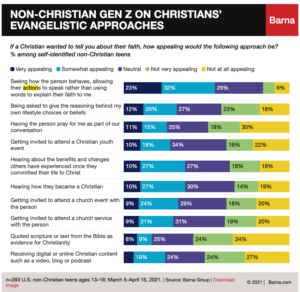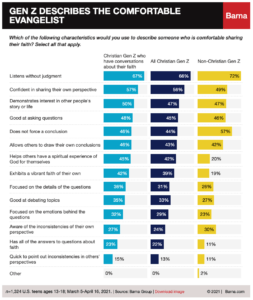Their curiosity about spirituality but disdain for overt proselytizing makes today’s teenagers a challenging group for Christians who want to share their faith with others, new research shows.
“According to non-Christian Gen Z, the most appealing evangelism occurs when Christians live out their faith, not when they explain it,” Barna Research reported in a study titled “Reviving Evangelism in the Next Generation.”
Appealing to those born roughly between 1997 and 2012 is further complicated by the generation’s lack of biblical literacy, said Priscilla Pope-Levison, research professor of practical theology at Southern Methodist University’s Perkins School of Theology and author of the 2020 book Models of Evangelism.

Priscilla Pope-Levison
“We can’t assume knowledge of Christianity on their part. Even with the kids raised in church we can’t use terms like ‘Crucifixion’ or ‘grace’ or ‘salvation,’” she noted.
But neither Pope-Levison’s assessment of the current faith-sharing environment nor the Barna survey offered pessimistic outlooks for evangelizing American teens.
Pope-Levison added that most obstacles — even the lack of religious education — can become opportunities for presenting the gospel to young people. “It makes it possible that many of them won’t be bored by it because they don’t know the story. They don’t know what the good news is all about, so they may be more open to it.”
It’s a situation like that of the early church when the apostles and others spread the faith to a Greco-Roman world totally unfamiliar with Christianity, she said. “This is an opportunity to stand up as believers and show where and how God is at work in this world. I think this is a really exciting time to be in evangelism because these challenges are opportunities and we have a cleaner slate, in a way.”
 Besides, the key elements of effective evangelism — hospitality, message, integrity, relationships, and church rootedness — continue to work even when adjusted to the nuances of Gen Z culture, she said. “And those don’t change. Those are so intrinsic to the good news that they are still applicable to Gen Z.”
Besides, the key elements of effective evangelism — hospitality, message, integrity, relationships, and church rootedness — continue to work even when adjusted to the nuances of Gen Z culture, she said. “And those don’t change. Those are so intrinsic to the good news that they are still applicable to Gen Z.”
Pope-Levison added, however, that sharing the gospel cannot rely solely on the actions or lifestyle of the evangelist, even if that is what young people favor.
“Teens do prefer faith in action, not just words. But I think it’s both-and. How else will they come to know Jesus? How will they understand what the gospel means if there isn’t some kind explanation of it?”
But according to Barna’s research, 55% of non-Christian teen respondents said they initially prefer evangelism approaches based on “how the person behaves, allowing their actions to speak rather than using words” to explain their faith.
Other methods scored much lower on the preference scale, including being asked to explain their own lifestyle (36%), being prayed for during the conversation (26%) or being invited to attend a Christian youth event (28%). Among the least appealing was having the Bible quoted (17%), Barna said.
Barna also found that Christian young people responded in similar ways, indicating that Gen Z Christians understand the expectation of their non-Christian peers and want to lean away from overt evangelistic encounters and instead focus on relational, embodied faith.
“Overall, Christian Gen Z teens do not seem to live in a ‘Christian bubble,’” the Barna report said. “They exhibit awareness of and even agreement with how their non-Christian peers think and feel about evangelization. They want to have low-stakes conversations for the benefit of their friendships.”
 Respondents also were asked to describe the attributes of people they perceive to be comfortable sharing their faith.
Respondents also were asked to describe the attributes of people they perceive to be comfortable sharing their faith.
“The majority of teens (especially non-Christians) says someone who listens without judgment (66% Christian, 72% non-Christian) seems like a person who’s comfortable sharing their faith.”
That response “is telling in light of past Barna findings which showed that a number of Gen Z who had interacted with church or Christianity said church was not a safe space to express doubt. Gen Z teens desire conversation partners who are open to difficult topics.”
The survey found that Christian teenagers also look positively on those confident in sharing their opinions (56% vs. 49% for non-Christians), on those good at asking questions (45%, 46%) “while non-Christians look to those who don’t force a conclusion (57% vs. 44% Christians) or who demonstrate interest in other people’s stories (47% each).”
Related articles:
Gen Z Christians more open to share their faith than Millennials
Millennial, Gen Z Christians support missions — with reservations
She’s Gen-Z, became leery of the church but practices faith with fitness


